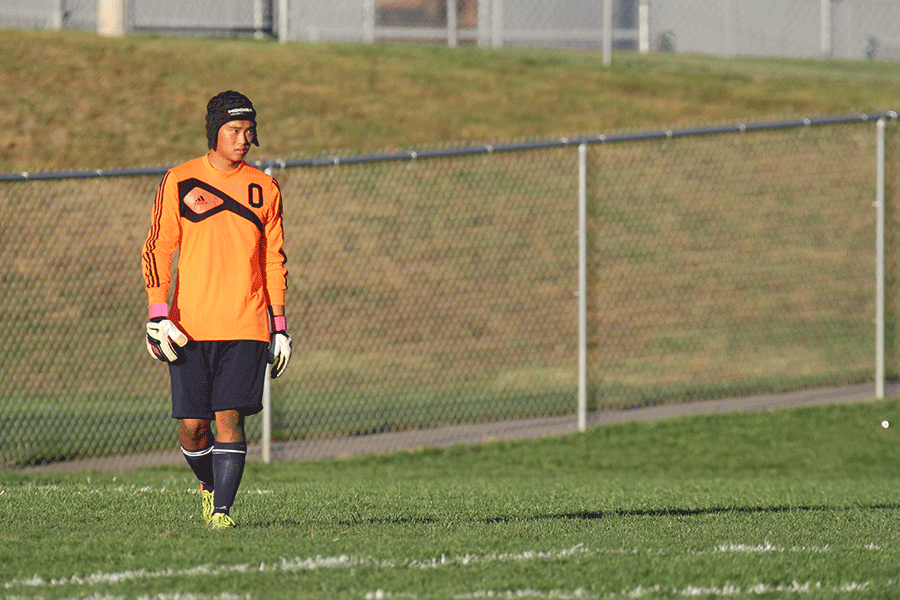Concussion helmets banned by KSHSAA
KSHSAA’s new soft headgear policy bans the use of concussion helmets in high school sports, excluding soccer
Playing Piper high school on Tuesday, Oct. 7, junior varsity goalie Parker Billings wears his concussion helmet because he feels that it gives him an additional level of safety during the game.
October 16, 2014
The Kansas State High School Activities Association (KSHSAA) released a new policy in September that bans the use of soft or padded headgear (commonly referred to as concussion bands/helmets) in sports in compliance to the National Federation of State High School Association’s rules, in all sports except for soccer.
This new policy was set in place because, according to KSHSAA’s statement online (kshsaa.org), “there is no medical or scientific evidence that soft or padded headgear products are effective at preventing concussions.”
However, physical trainer Clint McAllister believes that concussion bands may be able to help with concussions caused by direct blows to the head.
“If you can prevent one concussion from a direct blow is it worth it? I think so,” McAllister said.
Jennifer Jamison, mother of sophomore Elise Jamison who recently had a concussion, has a similar view on this topic.
“If an athlete likes the comfort and assurance that a brace or band provides I believe that it is a personal choice and they should be allowed to make that choice,” Jennifer said via email.
McAllister does not agree with the new policy.
“I don’t see why it’s illegal,” McAllister said. “If you hurt your elbow, I can pad your elbow. So why can’t I pad your head if you hurt it?”
Jennifer compares the use of concussion bands to the use of knee braces in sports saying, “wearing braces or concussion bands cannot 100 percent promise the prevention of further injury.”
McAllister thinks it’s difficult to choose what’s right and what’s wrong.
“It’s really hard to say,” McAllister said. “If it’s not going to hurt anyone then what’s the risk of having them?”
Junior varsity goalie Parker Billings, although not affected by this change, uses concussion bands to provide a little bit more safety during his soccer games.
“I wear [my concussion band] if the team we’re playing is aggressive,” Billings said. “I haven’t been hit while wearing it yet but in the future I can see myself hitting something or getting hit [and getting hurt].”
Billings, like McAllister, also questions the banning of concussion bands in sports.
“I just think it’s dumb of them because if anything, [the headgear] is for safety,” Billings said. “If they’re taking away something that is meant to keep people safe it’s kind of ignorant.”
Children’s Mercy Hospital sports medicine program manager Nicole B. Fillingame argues that this may not be the case.
“[Concussion bands] can also lead to injuries to the opposing player,” Fillingame said via email. “If the headgear makes contact with the opponent’s face or another exposed area of the body the equipment can cause lacerations, abrasions, etc.”
Athletic director David Ewers said KSHSAA is trying to prove a point.
“My opinion is that KSHSAA is trying to make sure that soft or padded headgear isn’t seen as a preventive device for concussions,” Ewers said. “They don’t want to make kids feel invincible.”
Fillingame supports this idea.
“Wearing soft headgear may give the athlete a false sense of protection, therefore making them feel they could be more aggressive which could lead to more injuries,” Fillingame said.
According to Ewers, KSHSAA is protecting itself and its players with this new policy by letting players know that concussions bands won’t fully protect them, so players should just wait until they’re fully healed to return to activities without having to wear headgear.
“We’re all governed by KSHSAA,” Ewers said. “If they make a recommendation, we have some flexibility. If they make a policy, we are obligated to follow it.”










